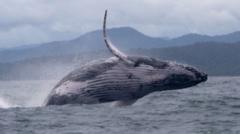Scientists reveal that a male humpback whale has completed a record-breaking migration of at least 13,000 km, potentially as a result of climate change affecting food sources.
Humpback Whale Embarks on Record-Breaking Journey, Climate Change Suspected

Humpback Whale Embarks on Record-Breaking Journey, Climate Change Suspected
A male humpback whale's extraordinary migration from Colombia to Zanzibar astounds researchers.
In a remarkable display of endurance, a humpback whale has undertaken one of the longest and most unusual migrations ever documented. Starting its journey in the Pacific waters off the coast of Colombia in 2017, the whale was soon spotted in 2022 near Zanzibar, India, covering an estimated distance of 13,000 kilometers. Researchers are speculating that climate change may be responsible for altering food availability, prompting this extraordinary voyage.
Ekaterina Kalashnikova, a researcher with the Tanzania Cetaceans Program, described the migration as "truly impressive and unusual even for this highly migratory species." Given its distance, experts are leaning towards this journey being the longest recorded for a humpback whale to date. Typically, these whales migrate annually from tropical breeding grounds to cooler feeding areas, yet this male's adventure set it on a path to traverse two distinct breeding habitats.
Experts are positing two main theories behind this unique journey. The first concerns climate change's impact on krill populations, which are a fundamental food source for humpback whales, driving them to seek nourishment far beyond their normal territories. The second theory suggests that the whales may be venturing into new breeding environments, a possibility buoyed by growing whale populations due to global conservation efforts.
"The underlying reasons remain ambiguous; however, global climate fluctuations, heightened occurrences of extreme environmental events, and inherent species evolution are likely factors," explained Dr. Kalashnikova.
Initially captured by researchers off Colombia’s Pacific coast in 2013, the same whale was re-identified in subsequent years, showcasing a great-circle distance of approximately 13,046 km—representing the shortest possible path of the whale's migration, with actual distances possibly being greater due to its spherical journey.
The groundbreaking analysis draws from hundreds of thousands of photographs submitted by researchers and the public alike to the citizen science platform, happywhale.com. This innovative database employs artificial intelligence to identify and track unique fluke patterns of humpback whales, allowing for detailed mapping of their global movements. The full research findings are published in the journal, Royal Society Open Science.





















